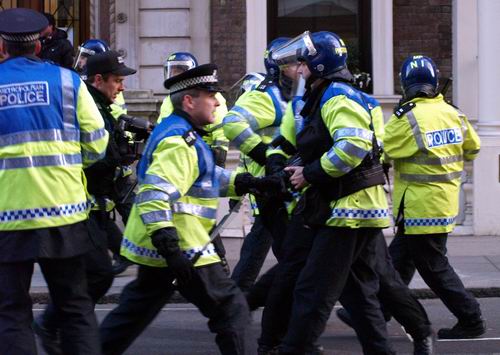We joke not..
The relationship between photographers and police could worsen next month when new laws are introduced that allow for the arrest and imprisonment of anyone who takes pictures of officers ‘likely to be useful to a person committing or preparing an act of terrorism’.
Set to become law on 16 February, the Counter-Terrorism Act 2008 amends the Terrorism Act 2000 regarding offences relating to information about members of armed forces, a member of the intelligence services, or a police officer.
The new set of rules, under section 76 of the 2008 Act and section 58A of the 2000 Act, will target anyone who ‘elicits or attempts to elicit information about [members of armed forces] … which is of a kind likely to be useful to a person committing or preparing an act of terrorism’.
A person found guilty of this offence could be liable to imprisonment for up to 10 years, and to a fine.
Actions are planned
Sign up here
 http://www.pledgebank.com/s76photo
http://www.pledgebank.com/s76photo Post your images here www.flickr.com/groups/1011510@N21
Please pass onto all your contacts, post into the groups your involved with and spread like wildfire this has simply gone to far see www.fitwatch.blogspot.com/ now one is not anti police per say , but if there upto no good, takeing images of us on actions so forth then we should be taking images of them for the widder public good.
We see a time when taking any images in public, or upon land will also be baned, as an active urban explorer and politcal actavist i find this well fucked to be frank
Squatting: a basic Guide
 http://www.myspace.com/sheffieldsquatters
http://www.myspace.com/sheffieldsquatters Photography: Your Rights
 http://www.urban75.org/photos/photographers-rights-and-the-law.html
http://www.urban75.org/photos/photographers-rights-and-the-law.html Facebook group
 http://www.facebook.com/groups.php?ref=sb#/group.php?gid=57175249318
http://www.facebook.com/groups.php?ref=sb#/group.php?gid=57175249318 The big problem with this law, like Section 58 of the Terrorism Act 2000 which it amends, is that it’s drawn so broadly.
There’s no requirement for proof of intent, merely that the gathering or publication of information “which is of a kind likely to be useful to a person committing or preparing an act of terrorism”
The only defence of a ‘reasonable excuse’ puts the onus on the defence to prove that they were not committing a crime, rather than on the prosecution to prove that a crime was committed. In practical terms, you have to prove your innocence.
We have an example of where this can lead with last year’s case of a Nottingham University student, who was arrested for possession of dodgy material (relevant to his Thesis) and released after nearly a week.
 http://www.theregister.co.uk/2008/08…tt_uni_update/
http://www.theregister.co.uk/2008/08…tt_uni_update/ Quote:
Following Mr Sabir’s release, the police wrote to him. Allegedly, they warn that he risks re-arrest if found with the manual again and add: “The university authorities have now made clear that possession of this material is not required for the purpose of your course of study nor do they consider it legitimate for you to possess it for research purposes.”
Mere curiosity, political interest or even direct relevance to the topic of your research is not a reasonable excuse, according to Nottinghamshire Police, only a University sanctioned course requiring you to possess it suffices.
A couple more Guardian stories, with more background
 http://www.guardian.co.uk/education/…ereducation.uk
http://www.guardian.co.uk/education/…ereducation.uk  http://www.guardian.co.uk/uk/2008/ju…rity.terrorism
http://www.guardian.co.uk/uk/2008/ju…rity.terrorism Now this is at the higher legal level at the point where the CPS will be getting involved.
We’ve seen how s44 is used on a day-to-day basis and how little the police like being observed and recorded even in the absence of law prohibiting it.
It seems all too obvious how it’s going to be used on the street
The act is here:
 http://www.opsi.gov.uk/acts/acts2008…#pt7-pb3-l1g76
http://www.opsi.gov.uk/acts/acts2008…#pt7-pb3-l1g76 and the text is
Quote:
76Offences relating to information about members of armed forces etc
(1)After section 58 of the Terrorism Act 2000 (collection of information) insert—
“58AEliciting, publishing or communicating information about members of armed forces etc
(1)A person commits an offence who—
(a)elicits or attempts to elicit information about an individual who is or has been—
(i)a member of Her Majesty’s forces,
(ii)a member of any of the intelligence services, or
(iii)a constable,which is of a kind likely to be useful to a person committing or preparing an act of terrorism, or
(b)publishes or communicates any such information.
(2)It is a defence for a person charged with an offence under this section to prove that they had a reasonable excuse for their action.
(3)A person guilty of an offence under this section is liable—
(a)on conviction on indictment, to imprisonment for a term not exceeding 10 years or to a fine, or to both;
(b)on summary conviction—
(i)in England and Wales or Scotland, to imprisonment for a term not exceeding 12 months or to a fine not exceeding the statutory maximum, or to both;
(ii)in Northern Ireland, to imprisonment for a term not exceeding 6 months or to a fine not exceeding the statutory maximum, or to both.
(4)In this section “the intelligence services” means the Security Service, the Secret Intelligence Service and GCHQ (within the meaning of section 3 of the Intelligence Services Act 1994 (c. 13)).
(5)Schedule 8A to this Act contains supplementary provisions relating to the offence under this section.”.
(2)In the application of section 58A in England and Wales in relation to an offence committed before the commencement of section 154(1) of the Criminal Justice Act 2003 (c. 44) the reference in subsection (3)(b)(i) to 12 months is to be read as a reference to 6 months.
(3)In section 118 of the Terrorism Act 2000 (c. 11) (defences), in subsection (5)(a) after “58,” insert “58A,”.
(4)After Schedule 8 to the Terrorism Act 2000 insert the Schedule set out in Schedule 8 to this Act.

 http://www.bjp-online.com/public/showPage.html?page=836646
http://www.bjp-online.com/public/showPage.html?page=836646  http://www.pledgebank.com/s76photo
http://www.pledgebank.com/s76photo  http://www.flickr.com/groups/1011510@N21/
http://www.flickr.com/groups/1011510@N21/ 
 e-mail:
e-mail:
 Homepage:
Homepage:

Comments
Display the following 6 comments